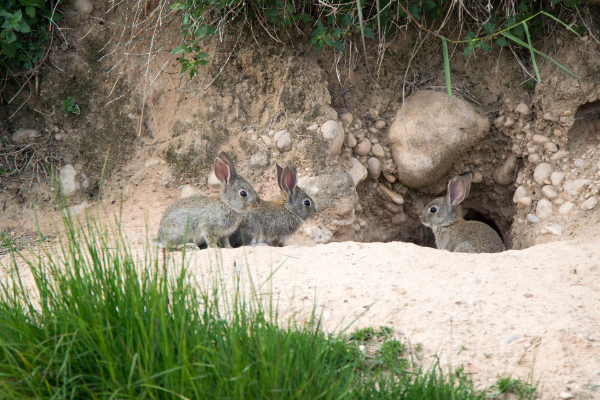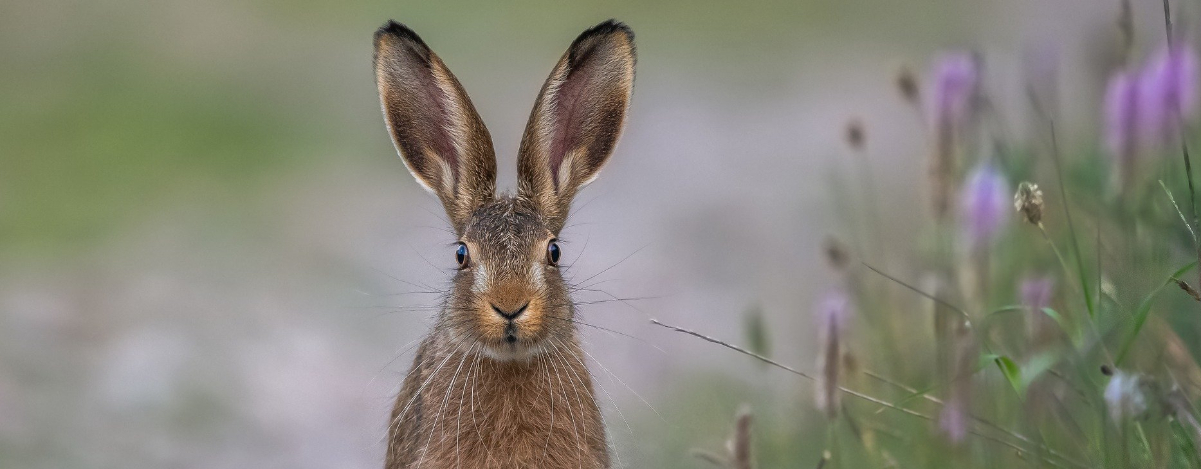What are the signs of rabbits?
If you are a new farmer or a homeowner with a large garden on your property, then it's possible you may see a wild rabbit on your land and think, "aww, how cute". No doubt the furry little things are adorable in appearance, but it's best to remember that rabbits and hares are classified as a pest under national guidelines.
Therefore keeping a watchful eye out for their presence is a good idea. Even if you don't see any rabbits directly, some telltale signs give away their presence.

Droppings
Rabbit droppings are easily distinguished from most rodent droppings. They can be found in small piles, and they are brown in colour and round in shape. If you pick one up to feel it, you should notice a sawdust-like texture.
Stripped Bark
If trees or saplings on your property have the bark stripped from their base, you most likely have a rabbit problem. This is because tree bark is a regular part of a wild rabbits diet.
Burrows
Rabbits are burrowing animals, and if you find some of these burrows, you can quickly identify the owners. A rabbits burrow is 10-15cm in diameter, and you will usually find them on sloped ground. The entrance to these burrows will usually also have rabbit droppings and fur.
Eaten Plants
Your plants being eaten is admittedly symptomatic of a number of pest infestations. Still, rabbits are particularly voracious herbivores, and some of their favourite foods can be found in your garden. If you notice swathes of your plants being eaten to the ground seemingly overnight, then it's probably rabbits.
What problems can rabbits cause?
You have likely heard the term "breed like rabbits" at some point, but the true magnitude of its implications likely doesn't cross your mind too often. A litter of rabbits can contain six babies, and they can have six litters a year sometimes.
Rabbits are pests because of the potential damage they can cause to their surrounding environment if left to their own devices.
You should be most concerned about this if you are a farmer of any sort. Whether it's your crops, your livestock or even yourself, rabbits are wildlife that represents a potentially exponential threat to your land and livelihood.

It only takes seven rabbits to eat as much as a single sheep. When you consider how quickly rabbits reproduce, it's obvious how quickly the problem can get out of hand. If no measures are taken to curtail them, then you will be able to do nothing as the furriest swarm of locusts you have ever seen descends upon your crops and ruins your year.
Once a rabbit infestation takes hold, you will quickly notice that your sprawling fields have become a minefield. Rabbit burrows are just the right size for both you and your livestock to step in when you least expect it.
Depending on how badly you step into one of these burrows, you can come away with anything from a light sprain to a broken ankle, and the same goes for any horses, sheep or other animals on your farm. These injuries can result in regular expensive vet bills and sometimes may even necessitate one of your animals being put down.
If you own a forestry plantation, then don't think that you are safe from rabbits. One of a rabbits' favourite pastimes is to gnaw on the protective outer layer of bark on the base of trees and saplings. They do this to wear down their ever-growing teeth and presumably for fun.
What's not fun is when fungi and bacteria take advantage of the now unprotected tree and take root at its base. These will slowly kill the tree by depriving it of nutrients, and the rabbits will go on to strip the bark off of hundreds if not thousands of trees and saplings if left unchecked.
Both are at risk whether you have a small private garden or a swathe of land where you grow various wildflowers. Rabbits love to eat flowers. they start at the head and work their way all the way down the stem to the shoots.
Furthermore, it can be nearly impossible to keep rabbits out of an open garden with how mobile they are and how they like to burrow. Their burrowing and appetite mean that rabbits are pests that pose an ever-present threat to your garden and grass.
Rabbits are social creatures. In large enough numbers, their burrows tend to end up forming vast and complex networks of tunnels.
These tunnels will often form underneath structures and roads and can eventually collapse as they undermine the structural integrity of whatever is above them.
Why Should Rabbits Be Treated?
While many consider rabbits to be cute and loving pets, the fact of the matter is that wild rabbits are a menace to farmland and gardens and should be treated as such. Not only do they cause environmental and structural damage and economic losses to your farm business, but they also often carry diseases and parasites that can be transmitted to pets and domestic animals such as fleas.
If that wasn't enough, there is also a legal obligation that all landowners in the UK are required to uphold called the Pests Act 1954. This act dictates that England and Wales are rabbit clearance areas with the exception of London, the Isles of Sicily and Skokholm island. This means that landowners are legally obligated to use pest control services and treatments to keep the rabbit population in check.
How to Keep Rabbits Off Your Garden or Land
As a landowner, it should be apparent by now that rabbits are bad news. You will want to get rid of them or prevent them from coming, but the actual details of how to deal with the problem may still elude you. If that is the case, then please read on to find advice on what sort of diabolical solutions are most commonly employed to keep the fluffy menace at bay.
1) Using a chicken wire cover is a great preventative measure that will dissuade all but the hungriest of rabbits from attempting to eat your plants.
This method is best suited to protecting newly planted bulbs and seeds while they are young. This is because while chicken wire will deter most rabbits, a determined invader will still manage to find a way past it.
Therefore it may not be as effective at guarding an obvious bounty of blooming flowers as it is at preventing opportunists from eating your saplings before they have a chance to grow.
2) While rabbits aren't exactly picky eaters, for the most part, there are still some things that they don't like to eat.
By planting things like lavender and holly, you should be able to enjoy your garden without it getting eaten. This is the case because rabbits don't like to eat plants that have strong scents, sap, prickles, or tough leaves.

3) Dogs and cats are the perfect species for pest control. As a deterrent, simply letting your pet outside whenever you see a rabbit should chase it off.
Eventually, the rabbits will figure out that your property is the territory of a predator, and they may relocate themselves without you needing to do anything else.
Certain breeds of dogs and most cats, in general, are also proficient hunters and are perfectly able to catch and kill a rabbit on their own. This goes for cats doubly so and hunting dogs such as terriers who were literally bred to be the natural predator of vermin and pests such as rabbits.
4) Maintaining your perimeter fencing and reinforcing it can be an effective measure of keeping rabbits from getting onto your property.
By regularly searching and checking your fence for any damaged segments or holes buried underneath, you can fix most intrusions before they get too bad. Consider placing rocks or concrete slabs on the ground where you think they might dig to make it more difficult for them.
Keep in mind that depending on the size of your property and the regularity with which you need to repair the fence, this method may become prohibitively expensive.

5) If a group of rabbits has made their home in your garden or on your land, and you know where they live, then there is always the option of changing their habitat in such a way to make it either unliveable or undesirable.
To do this, you should either block off the area entirely or cut away the vegetation.
If they can't access their burrow or find places to hide nearby from predators, they should leave for greener pastures, hopefully far away from your property.
6) If you aren't particularly bothered about how your favourite flowers smell, you could use a homemade repellent to make them unappetising to the rabbits.
To do this, simply mix up a concoction of strong-smelling cooking ingredients such as chilli powder and some detergent in a spray bottle and spritz the rabbit's favourite meals. This should ward them off for the most part.
7) Rabbit fencing is probably the most effective prevention method when it comes to rabbit caused infestations.
It is a special type of fencing that is installed by a pest control specialist that acts as a wall of Babylon for your garden or property.
8) If you have tried all of the above and are still experiencing a rabbit infestation, the best option for you will be to contact pest control services.
They will take the issue off your hands and have their own specialised methods and traps for containing and removing all sorts of pest-related problems such as gassing.
Give us a call today to answer any concerns or advice you need about pests and the safety of your home!
Are you looking for Rabbit control services?
Do you have a rabbit problem in Burton upon Trent or Staffordshire?
If you would like to find out more information about the rabbit control services we offer follow the link below.
Rabbit Pest Control


